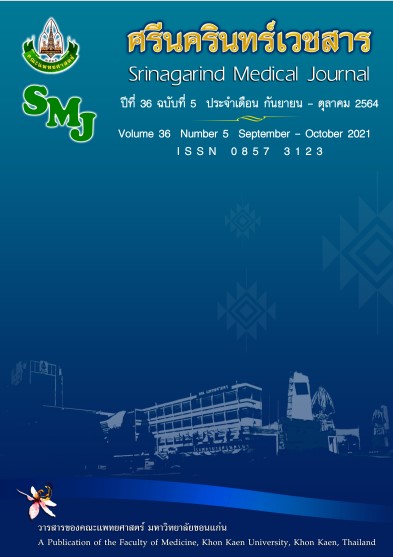Effects of the Self-Efficacy Enhancing Program on the Practice Behavior of Caregivers for the Older Patients with Mild Traumatic Brain Injury after Discharge and Post-concussion Syndrome
Keywords:
Self-Efficacy; Caregivers; Older Patients with Mild Traumatic Brain Injury; Post-Concussion SyndromeAbstract
Background and Objective: The older patients with mild traumatic brain injury (mTBI) after being discharged, have a higher mortality rate. The caregiver plays an important role. The purposes of this study were to examine the effects of the self-efficacy enhancing program on the practice behavior of caregivers for the older patients with mTBI after discharge and post-concussion syndrome.
Methods: The study was a quasi-experimental research two groups posttest design. The fifty-six participants who were caregivers for the older patients with mTBI at Accident and Emergency Ward 2 which divided into a control group and intervention group equally. The experimental group received the self-efficacy enhancing program while the control group received a usual care program. The instruments used were 1) the practice behavior of caregivers and post-concussion syndrome in the older patients during 48 hours questionnaire and 2) the practice behavior of caregivers and post-concussion syndrome in the older patients during 2 weeks questionnaire. Data were analyzed using Independent t-test, and Mann-Whitney U test.
Results: The results for 48 hours and 2 weeks after brain injury showed that the experimental group gained scores on the practice behavior of caregivers higher than those of control group at level of significance (p <.05). Also, it was indicated that the older patients with mTBI in the experimental group had post-concussion syndrome differences from those who were in the control group at level significant (p <.05).
Conclusions: The program can be used to increase caregivers’behavior in caring of the older with mTBI in order and reduced the post-concussion syndrome after discharged.
References
2. Mcintyre A, Janzen S, Teasell R. Traumatic brain injury in older adults: A review. Top Geriatr Rehabil 2014; 30(30): 230–236.
3. งานเวชระเบียนและสถิติ โรงพยาบาลศรีนครินทร์ คณะแพทยศาสตร์มหาวิทยาลัยขอนแก่น. สถิติผู้ป่วยโรงพยาบาลศรีนครินทร์ จังหวัดขอนแก่น 2561. ขอนแก่น, 2562.
4. Cnossen MC, Van Der Naalt J, Spikman JM, Nieboer D, Yue JK, Winkler EA, et al. Prediction of persistent post-concussion symptoms after mild traumatic brain injury.
J Neurotrauma 2018; 35(22): 2691–2698.
5. Broshek DK, De Marco AP, Freeman JR. A review of post-concussion syndrome and psychological factors associated with concussion. Brain Inj 2015; 29(2): 228–237.
6. Ontario Neurotrauma Foundation. Guideline for concussion/mild traumatic brain injury & amp; persistent symptoms [Internet]. 2018 [cited Aug 20, 2019]. Available from: https://braininjuryguidelines.org/concussion/fileadmin/media/adult-concussion-guidelines-3rd-edition.pdf.
7. รุ่งนภา เขียวชะอ่ำ. ผลกระทบภายหลังการเจ็บที่สมอง.วารสารวิทยาลัยพยาบาลพระปกเกล้า จันทบุรี 2559; 27(1): 103-111.
8. รพีพร โรจน์แสงเรือง. การรักษาผู้สูงอายุที่ได้รับบาดเจ็บ. ใน: วีรศักดิ์ เมืองไพศาล,บรรณาธิการ. การจัดการภาวะฉุกเฉินสำหรับผู้สูงอายุ. พิมพ์ครั้งที่ 2. นนทบุรี: ภาพพิมพ์, 2560: 31-42.
9. Yamagami K, Kurogi R, Kurogi A, Nishimura K, Onozuka D, Ren N, et al. The influence of age on the outcomes of traumatic brain injury: findings from a japanese nationwide survey (J-ASPECT Study-Traumatic Brain Injury). World Neurosurg 2019; 130:e 26–46.
10. วีรศักดิ์ เมืองไพศาล. ภาวะฉุกเฉินทางระบบประสาทที่พบบ่อยในผู้สูงอายุ. ใน: วีรศักดิ์ เมืองไพศาล, บรรณาธิการ. การจัดการภาวะฉุกเฉินสำหรับผู้สูงอายุ. พิมพ์ครั้งที่ 2. นนทบุรี: ภาพพิมพ์, 2560: 134-166.
11. ปณิตา ลิมปะวัฒนะ. กลุ่มอาการสูงอายุ. ใน: ปณิตา ลิมปะวัฒนะ, บรรณาธิการ. กลุ่มอาการสูงอายุและประเด็นทางสุขภาพที่น่าสนใจ. พิมพ์ครั้งที่ 2. ขอนแก่น: คลังนานาวิทยา, 2561: 1-12.
12. Cuthbert JP, Harrison-Felix C, Corrigan JD, Kreider S, Bell JM, Coronado VG, et al. Epidemiology of adults receiving acute inpatient rehabilitation for a primary diagnosis of traumatic brain injury in the United States. J Head Trauma Rehabil 2015; 30(2): 122–135.
13. รพีพร โรจน์แสงเรือง. อุบัติเหตุในผู้สูงอายุ. ใน: ธาวิณี ไตรณรงค์สกุล, ไชยพร ยุกเซ็น, รพีพร โรจน์แสงเรือง, บรรณาธิการ. คู่มือการดูแลผู้ป่วยอุบัติเหตุ. กรุงเทพฯ: ช่อระกาการพิมพ์, 2556: 169-178.
14. Gardner RC, Dams-O’Connor K, Morrissey MR, Manley G. Geriatric traumatic brain injury: epidemiology, outcomes, knowledge gaps, and future directions. J Neurotrauma 2018; 35: 889–906.
15. ราชวิทยาลัยประสาทศัลยแพทย์แห่งประเทศไทย. แนวทางเวชปฏิบัติกรณีสมองบาดเจ็บ. กรุงเทพฯ: พรอสเพอรัส พลัส; 2562.
16. Hickey JV, KS M. Craniocerebral injuries. In: Hickey JV, editor. The clinical practice of neurological and neurosurgical nursing. 7th ed. Philadelphia: William & Wilkins; 2014: 343–381.
17. Bandura A. Self – efficacy the exercise of control. 11th ed. New York: W. H. Freeman and Company; 1997.
18. Firmawati E, Songwathana P, Kitrungrote L. Effect of self-efficacy enhancing education program on family caregivers’ competencies in caring for patients with mild traumatic brain injury in Yogyakarta, Indonesia. Nurse Media J Nurs 2014; 4(2): 767–783.
19. เสาวนุช สมศรี, อัจฉรา สุคนธสรรพ์, สุภารัตน์ วังศรีคูณ. ผลของการวางแผนการจำหน่ายผู้บาดเจ็บสมองระดับเล็กน้อยจากแผนกฉุกเฉินต่อความรู้และการปฏิบัติของผู้ดูแล. พยาบาลสาร 2560; 44: 86–98.
20. Polit FD, Beck TC. Nursing research generating and assessing evidence for nursing practice. 10th ed. Philadelphia: Lippincott William & Wilkins; 2017.
21. Dwyer B. Posttraumatic headache. Semin Neurol 2018; 38(6): 619–626.
22. Lavigne G, Khoury S, Chauny JM, Desautels A. Pain and sleep in post-concussion/mild traumatic brain injury. Pain 2015; 156(4): S75–85.
23. Bramley H, Hong J, Zacko C, Royer C, Silvis M. Mild traumatic brain injury and post-concussion syndrome. Sports Med Arthrosc 2016; 24(3): 123–129.
24. พนิตนาฏ ลัม, ธีรนุช ห้านิรัติศัย, ดิลก ตันทองทิพย์. ผลของโปรแกรมการดูแลอย่างต่อเนื่องต่อการรับรู้สมรรถนะแห่งตนของผู้ดูแลและกลุ่มอาการหลังการบาดเจ็บของผู้บาดเจ็บศีรษะเล็กน้อย. รามาธิบดีพยาบาลสาร 2562; 25: 58-73.




